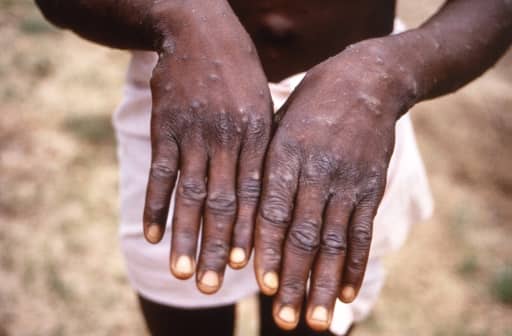Misinformation abounds about monkeypox
13 June, 2022

The recent emergence of hundreds of cases of monkeypox worldwide has already triggered a flood of misinformation online, much of it modeled on conspiracy theories that have been circulating since the start of the COVID-19 pandemic.
AFP Fact Check examined three claims that have arisen in the month since monkeypox cases began being recorded outside of areas in western and central Africa where it is endemic.
Not a vaccine side effect
Social media posts shared across the world have incorrectly claimed that the recent monkeypox cases are a "side effect" of the AstraZeneca COVID-19 vaccine.
The claim is linked to the fact that AstraZeneca's jab uses a chimpanzee adenovirus vector.
But health experts told AFP that this idea "has no basis in fact", in part because the viruses belong in different families -- poxvirus for monkeypox, and adenovirus for the COVID vaccine. The vaccine "cannot generate new viruses inside humans and cause something like monkeypox," said Professor Eom Jung-shik, an infectious disease expert at the Gachon University Gil Medical Center.
The adenovirus is the vaccine vector, which means it is only a vehicle to transport genetic instructions to the body to trigger the production of a spike protein similar to that of the SARS-CoV-2 virus. This then prompts an immune response so the body can fight a real infection.
As in other viral vector vaccines, the chimpanzee adenovirus has been altered so it does not infect humans or replicate.
Professor Yoo Jin-hong, an epidemiologist at the Catholic University of Korea, said the AstraZeneca claim "appears to stem from the idea that chimpanzees are broadly referred to as monkeys, but this is a very ignorant rumor with no basis in fact".
Monkeypox was given its name because it was first discovered in a group of macaques in 1958 that were being studied for research purposes, but they are not the only animals that catch the disease.
Rodents are the most likely natural reservoir of monkeypox, according to the World Health Organization.
Pfizer does not have a monkeypox vaccine
Social media posts have also claimed that the U.S. Food and Drug Administration (FDA) recently approved a new monkeypox vaccine from pharma giant Pfizer, which developed the first available COVID vaccine.
This is false; the only vaccine for the prevention of monkeypox in the United States was approved by the FDA in 2019, and Pfizer does not manufacture it.
Abby Capobianco, a press officer at the FDA, told AFP that the vaccine, called Jynneos, was "licensed by FDA for the prevention of smallpox and monkeypox disease in adults 18 years of age and older determined to be at high risk for smallpox or monkeypox disease."
Jynneos is not a new vaccine -- the FDA approved it in September 2019.
Pharmaceutical company Bavarian Nordic, which produces Jynneos, announced on May 18, 2022 that the U.S. government had placed a $119 million order for freeze-dried doses.
Jynneos is the only FDA-approved vaccine for monkeypox, however data has shown that a smallpox vaccine is 85 percent effective in preventing the disease, according to the U.S. Centers for Disease Control and Prevention.
Pfizer told AFP that the company does not have a monkeypox vaccine.
False Canada shingles claim
Social media posts shared an image of a purported article from Canada's CTV News claiming that 95 percent of the monkeypox cases investigated by Canadian officials turned out to be shingles.
However Rob Duffy, CTV News manager of communications at its parent company Bell Media, told AFP that the network "never published such a story and that the screenshot does not show an authentic article from CTV News".
While some symptoms might be similar in cases of shingles and monkeypox, they are not caused by the same virus, according to Isaac Bogoch, professor at the Temerty Faculty of Medicine at the University of Toronto.
"There may be some overlap in their clinical presentation," but "monkeypox and shingles are two completely different infections," he told AFP.
Source: japantoday.com
